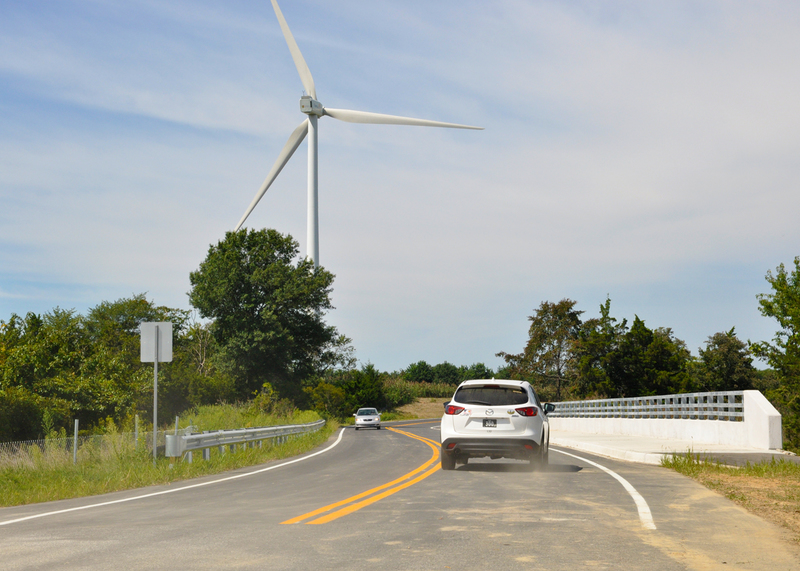A federal lawsuit filed by a Lewes resident seeking to halt the University of Delaware wind turbine was dismissed by a U.S. District Court judge Jan. 15.
Judge Gregory M. Sleet of the District of Delaware dismissed Gerald Lechliter's claims that backroom dealings led to an expedited approval process for the university's wind turbine at the College of Earth, Ocean and Environment in Lewes.
With federal claims resolved, Lechliter said a 2012 suit filed in the Court of Chancery can now move forward.
Lechliter filed the federal lawsuit Jan. 9, 2012, listing the University of Delaware, Department of Natural Resources and Environmental Control, then Lewes Mayor and City Council members and the city's building inspector, U.S. Department of Energy and other groups associated with the construction of the wind turbine.
Lechliter alleged the university obtained permits for the turbine based on behind-the-scenes negotiations with DNREC and Lewes officials and “its public misrepresentations that the wind turbine would cause no intrusive noise and not result in diminution of property values.”
|
University study shows local support for wind turbine A recent University of Delaware study has found most local residents approve of the university's wind turbine, although about one in 10 respondents say the sound it makes is bothersome.
In 2012 and 2013, the University of Delaware conducted a public perception study and reviewed more than 450 responses; 47 percent were filled out by Lewes residents. Here's a break down of some notable survey points:
Positive results:
Negative results:
Other results:
University of Delaware professor Jeremy Firestone, who conducted the survey alongside graduate students Alison Bates and Lauren Knapp, said the survey results show that a majority of Lewes residents support the wind turbine, especially because it represents progress toward clean energy.
“It is the only commercial-scale wind turbine in the state of Delaware, so there's a distinction that Lewes holds,” he said. One of the interesting findings, he said, is that people are often more motivated by socially constructed aspects of the turbine, so those who like the look of the turbine often equate the turbine with the notion of moving toward clean energy while those who don't like the look of the turbine say it does not fit within the landscape. “We found a lot more conflict among the people who are negative,” he said when he presented the survey's findings at a climate change workshop in December. “Even though some people say they are negatively affected by the Lewes wind turbine, almost half of them didn't think community wind should be discouraged. … They're negative about it, but they're a little uncomfortable with their own position.”
The full survey results, which also include a look at offshore wind and offshore wind transmission, are expected to be published in the first half of 2015, Firestone said. |
||
Lechliter alleges Nancy Targett, dean of the College of Earth, Ocean and Environment, sent a Feb. 16, 2010 email to then DNREC Deputy Secretary David Small, requesting the agency intervene to speed up the approvals process for construction of the wind turbine because the university had a narrow window to purchase the wind turbine and use a specialty crane to mount it on its tower.
Sleet addressed claims against each party individually. For the city of Lewes, Sleet said Lechliter's claim was that the turbine affected the enjoyment of his land, and that the city did not afford him adequate procedures to protest the turbine. In his judgement, Sleet said, Lechliter has no protected interest in the property.
“An adjacent property owner like Lechliter has no entitlement to the land on which the wind turbine was built,” Sleet said. “Lechliter's argument that the wind turbine interferes with the 'peaceful enjoyment' of his own land fails for the same reasons.”
Sleet says Lechliter has no claim against DNREC as a whole, as the federal law he cites (§ 1983) does not provide him grounds to take action against an organization, only a person. As far as DNREC officials named in the suit – former Secretary Collin O'Mara, then Deputy Secretary David Small and Director of Division of Parks and Recreation Charles Salkin – Sleet says state officials acting in their official capacities are exempt under the statute Lechliter cited.
Sleet says Lechliter's claims against the Department of Energy are moot because the turbine is already constructed and fully operational with more than 95 percent of its funding for the project spent.
“Courts have uniformly held that jurisdiction is lacking where plaintiffs seek after-the-fact evaluation of National Environmental Protection Act procedures for projects that are already completed,” Sleet said.
Sleet granted a motion for dismissal for UD, its named officials and the businesses associated with the construction of the wind turbine because the subject matter in Lechliter's lawsuit did not fall under Sleet's jurisdiction. Lechliter's only claims against UD were violations of state law, and Sleet said there was no basis for him to consider the allegations.
Lechliter, who represented himself, had been seeking damages in excess of $250,000.
On Jan. 22, Lechliter said he had already filed state-related claims in Chancery Court in October 2012 in anticipation of just this situation. That case was stayed pending the decision in the federal case.
“I've contacted opposing counsels about lifting the stay,” Lechliter said in an email. “I've heard from the state's attorney, who does not object.”
Lechliter said he will wait a week or so to hear from the other attorneys before officially submitting a motion to lift the stay.
“The ball will then be in their park to respond with an answer or motion,” he said.























































